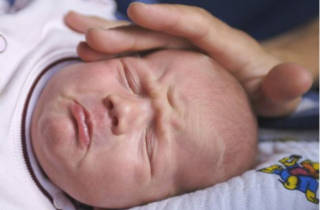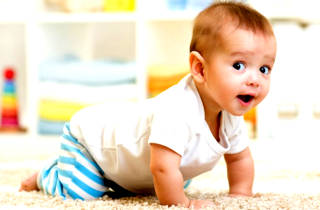The baby wakes up abruptly and cries. Why does a child cry in his sleep and not wake up?
Many parents are able to determine by the crying of their baby what exactly is bothering him, quickly eliminating the problem that has arisen.
And yet, sometimes even the most caring mother finds herself in a difficult situation when she finds out that the child often cries in his sleep.
What could this be connected with, and
In contact with
List of reasons why a baby may cry during the night's rest
Most often, a similar problem occurs with children who have already overcome the milestone first year life.
If one year old child cries in a dream, there may be several reasons, and each of them must be dealt with.
The problem may arise because the child is sick, is in pain during sleep, severe discomfort that is difficult to cope with.
The baby may cry because of, because nightmares visit not only adults, but also children.
Trouble can happen due to stress experienced by the child. If the baby has quarreled with his parents or witnessed a conflict between adults, this is quite capable of causing crying while resting.
Another reason could be an elementary child. This usually happens if the baby has played too much or visited an unfamiliar place for the first time.
The most serious reason of all is illness.
If, upon self-examination, the mother realizes that the baby has a fever or fever, she should immediately contact a specialist.
If signs of the disease could not be identified, then the cause lies in emotional and psychological problems.
If a mother notices that an infant is crying in his sleep, then the reasons for his condition will be completely different. Most often, a baby's crying during rest is associated with colic in the abdomen, from which most newborns suffer.
In addition, a common cause of the problem is the absence of a mother nearby.
Many children, even during sleep, feel a lack of communication with adults and therefore begin to be capricious.
If your newborn baby cries in his sleep, you should tell your therapist. When examining the baby, he will find out whether the problem is related to physiological reasons or whether it is a matter of psychological nuances of development.
What to do if the baby cries in his sleep for physiological reasons?
 When a child cries a lot in his sleep, his loving mother begins to build a wide variety of hypotheses about this, driving herself into fears about the condition of the baby.
When a child cries a lot in his sleep, his loving mother begins to build a wide variety of hypotheses about this, driving herself into fears about the condition of the baby.
The most important thing in such a situation is try to calm down and try to soberly analyze the situation.
First, the mother needs to check whether the child’s diaper is dry and whether he has a fever. Children may cry in their sleep because of what is happening right now. too cold or hot in room.
Since the child does not know how to express his feelings in any other way, he begins to get very nervous and cry.
If the mother is sure that the room temperature is normal and the baby’s diaper is dry, she should look further for the reason.
If Small child cries in his sleep, the reason may be due to the fact that he has... This procedure is quite painful, so the baby should purchase teethers that can help in the process of the appearance of the first teeth.
Also, the baby's cries may be associated with colic and general deterioration well-being. If in the morning the child behaves differently than usual, refuses to eat and drink, the mother should sound the alarm. It is better to get checked by a specialist in advance than to reap the fruits of your own frivolity later.
If the doctor detects other illnesses in the baby, he will be able to prescribe medications, mixtures, advise and traditional methods getting rid of the problem.
The main thing is that the mother does not ignore the cries of her baby, because he cries in his sleep for a reason.
Psychological causes of poor sleep
 If a child begins to cry in his sleep, and the therapist concludes that the baby is absolutely healthy, then the problem lies in psychological reasons.
If a child begins to cry in his sleep, and the therapist concludes that the baby is absolutely healthy, then the problem lies in psychological reasons.
It is quite possible that the baby just lacks attention adults, and in this way he tries to attract him.
Another relevant and common reason is elementary fear of the dark. Very often, children at an early age are afraid of the dark and start screaming as soon as they find themselves alone in an unlit room.
If the baby is already over a year old, then parents need try to explain the baby that there is nothing scary in dark rooms.
If the child is still very young, you should keep the night light on until the baby is fast asleep.
One of the most common reasons for children crying in their sleep is emotional overload. Perhaps the child has had several busy days, and therefore emotional overload finds such embodiment.
Very often, children prone to hyperactivity begin to cry during the night's rest, so parents should carefully monitor the baby's daily schedule. It is important that children do not behave too actively now, otherwise such psychological stress will affect their development in the future.
Often a child cries while sleeping because he simply does not have enough attention from his parents. When a child is weaned from the breast, taught to sleep separately, and the mother also regularly disappears at work, the baby begins to experience severe stress.
Such excitement may well result in crying during sleep. If a child cries loudly in his sleep, the mother should try to take him in her arms, lull him to sleep, and then the baby may well calm down. If such attacks recur regularly, you should seek advice from a therapist.
The most important thing a mother should remember is can't be ignored baby crying during the night's rest.
With the help of sobs, the baby tries to express your emotions, asks for help, and the parents’ task is to understand the cause of the problem and eliminate it.
Now, when the psychological and physiological health of the child may be under threat, the task of parents is to show their love for their child to the maximum, taking care of his speedy recovery.
Restless sleep of a child: video
A pediatrician explains the possible causes of poor sleep:
Attention, TODAY only!
In contact with
See inaccuracies, incomplete or incorrect information? Do you know how to make an article better?
Would you like to suggest photos on the topic for publication?
Please help us make the site better! Leave a message and your contacts in the comments - we will contact you and together we will make the publication better!
A healthy baby sleeps so soundly that he does not even react to sudden sounds. But children's sleep is not always so deep and calm. Every mother is familiar with the situation when a sleeping baby suddenly begins to scream and cry without opening her eyes. If this happens infrequently, then there is no serious cause for concern. And when such nightly “concerts” become regular, you should be alarmed. They can be a symptom of pathological changes in the baby's body.
Main reasons
Babies cry often. Until they learn other ways to communicate, crying is the only way they can get attention. After a couple of months, almost any mother can determine by the nature of the crying and its intensity what caused it and what the baby wants. But this is during the day. But to understand why a child starts screaming in his sleep without waking up can sometimes be very difficult.Physiological
Not too intense crying during sleep is most often caused by purely physiological reasons - the baby experiences some discomfort, but not so strong as to wake up.
The baby may whine and toss and turn due to:
- wet diaper or panties;
- feeling of hunger;
- uncomfortable air temperature;
- low air humidity;
- uncomfortable body position;
- pillow too high or low;
- when sounds or light prevent you from falling asleep soundly.
These causes of crying are the easiest to detect and eliminate, so you need to start with them. If after this the baby continues to sleep peacefully, then everything is fine and there are no serious problems.
Psychological
The psyche of a newborn is still extremely unstable: he gets excited very quickly, and it takes some time to calm down. Therefore, daytime experiences often affect the quality of sleep, and not only negative ones. Stormy joy is also stress, albeit a pleasant one.
Sometimes a baby cries in his sleep without waking up because:

Important! If during the day the parents sort things out too vigorously in the presence of the child, this will definitely be deposited in his subconscious, and at night the baby will sleep restlessly. The baby is very sensitive to the emotional state of loved ones, and negativity frightens him.
There is also such a thing as a sleep crisis, which occurs several times during the first year of life and manifests itself in the fact that the baby, who previously slept peacefully, begins to wake up frequently or cry at night. It has physiological causes and is associated with age-related changes occurring in the baby’s body. Typically, a sleep crisis goes away without any intervention within an average of two weeks.
Pathological
It makes sense to worry when the day has passed calmly, the baby has been provided with comfortable conditions for rest, in the evening he is full and happy, but at night he still starts crying and screaming. This may already be associated with acute or chronic diseases that need to be quickly diagnosed and treated:
- acute respiratory diseases of an infectious or viral nature;
- chronic ENT diseases in which breathing is difficult;
- otitis accompanied by severe ear pain;
- intestinal infections that cause fever and bloating;
- increased intracranial pressure, causing headaches;
- neurological diseases that provoke panic attacks.
Often, parents whose babies regularly cry at night run to the doctor in horror, but it turns out that the source of the problem is intestinal colic or teething, common in infants. But it’s better to play it safe and take at least basic urine and blood tests, which will show whether there are inflammatory processes in the baby’s body.
It is also advisable to consult a neurologist - he will be able to identify pathological changes at an early stage, when they can still be quickly dealt with.
What to do
If a baby, lying in his own crib, bursts into tears, then first of all he needs to be calmed down. Moreover, this should be done carefully - the child continues to sleep and a sudden awakening will only increase stress.
Dr. Komarovsky advises doing the following:
- approach the crib and carefully place your hand on the baby’s tummy or head;
- with the second hand, check whether the bed is dry and whether there are any creases or folds that interfere with sleep;
- carefully pick up the baby in your arms and hold him close to you;
- if he wakes up, offer him some water or breast;
- if the child is wet, change his clothes and diaper;
- check the temperature and humidity in the room;
- If the baby seems hot, be sure to set a thermometer so as not to miss the onset of the disease.
Don't put him back to bed and leave immediately. If your baby is crying a lot, hold him in your arms until he calms down completely. Or put him in a crib, but at the same time maintain tactile contact: stroke his tummy or head, lightly massage his legs and arms. When your baby falls asleep again, watch him for a while longer.
Prevention of crying
 To prevent a child from crying at night, he needs to create comfortable sleeping conditions and correct mode day. Komarovsky claims that a well-designed bedtime ritual in 90% of cases provides the baby with a full-fledged night rest.
To prevent a child from crying at night, he needs to create comfortable sleeping conditions and correct mode day. Komarovsky claims that a well-designed bedtime ritual in 90% of cases provides the baby with a full-fledged night rest.
The main elements of this ritual for the baby should be bathing, changing clothes, laying out the crib, switching the lighting to night and soothing communication (lullaby, fairy tale, etc.).
But the quality of a baby’s sleep is directly affected by events throughout the day. Here are the TOP 5 important principles that can provide a baby with healthy, sound sleep.
Daily regime
Ideally, your baby should wake up in the morning and go to bed at night at the same time. Naturally, with age the regime will be adjusted. But you need to do this smoothly, shifting daily by 10-15 minutes. And if you put your baby to bed every day different time, his body and psyche cannot adjust to sleep normally.
And don’t be afraid to wake up your child in the morning if the baby is too sleepy. Otherwise, he will not have time to get tired during the day, and sleep will not be sound.
Place to sleep
There is nothing more calming for a baby than consistency. Therefore, it is very important from the very first days of his life to decide where he will sleep at night. Many people now practice co-sleeping. If you decide so, let the baby sleep in your bed, but then put him next to him every day.
But it is better to immediately accustom the child to his own crib, which he will associate with a cozy and safe nest for sleep.
Feeding schedule
 The mistake of many parents is that they overfeed the baby in the evening (at 17-18 hours), and he does not eat well at night. Naturally, after 3-4 hours of sleep at night, he begins to feel hungry - that’s anxiety.
The mistake of many parents is that they overfeed the baby in the evening (at 17-18 hours), and he does not eat well at night. Naturally, after 3-4 hours of sleep at night, he begins to feel hungry - that’s anxiety.
During the first “dinner” it is better to underfeed him a little. Then at night the baby will drink plenty of milk and sleep peacefully all night.
Active day
A healthy child is always full of strength and energy, which must be released during the day so that its remnants do not interfere with sleep at night.
But outdoor games, learning, communication with peers and visiting relatives must be planned so that they end no later than 16-17 hours.
Quiet evening
Your baby's evening should be as calm and relaxing as possible. You shouldn't make noise or fool around after 17-18 hours. There are many other interesting activities: drawing, reading a book, building a house out of cubes. Try to keep your baby calm and positive during evening playtime.
The emotional and physical state of his parents, especially his mother, is also very important for the baby. He is connected with her energetically and immediately senses if the mother is tired, dissatisfied with something, upset, or sick. He will cry because his mother’s poor health causes him psychological discomfort.
When caring for your child, never forget about yourself. Make the most of your sleep time (ideally, sleep at the same time as your baby), and don't be shy about asking your family for help or admitting that you need extra rest.
One of the main principles that Komarovsky promotes is: “A calm mother means a healthy baby.” And this is very simple and valuable advice that is worth listening to.
Often mothers encounter a situation where babies cry for no apparent reason and do not wake up. In this case, parents act differently: some wake up the babies, while others do not touch them. In this article we will look at why a child cries in his sleep and does not wake up, as well as how to deal with it.
The main reasons for crying at night
There are many factors that influence a child’s rest:- 1. Up to a year, the reason for this may be a change in daily routine. When feeding on demand, the baby himself changes his sleep and rest time, while the body is being rebuilt, crying will not be uncommon.
- 2. At the stage of deep sleep, the baby's tears can cause any discomfort. A child is not always able to wake up because of a dirty diaper or uncomfortable clothes.
- 3. Fatigue. Due to the hormone cortisol, the baby’s body begins to rebel due to an incorrectly chosen regimen. Two hours before bedtime, you should stop any active games, exclude walks and entertainment.
- 4. Too many impressions. Even during a night's rest, the brain continues to analyze the information received during the day; if there was too much of it, then sleep will be restless.
- 5. The desire to be close to mom. In a baby, this need is present at the level of instincts.
- 6. Dreams. In babies they can be chaotic and even frightening.
- 7. Unpleasant moments during the day. Any negative impression ( Bad mood mothers, quarrels between parents, loud and frightening noises) can lead to stress and crying at night.
- 8. Malaise. Even if there are no other signs of the onset of the disease, crying can be a signal of the beginning of teeth growth, colic or a cold.
How to deal with anxiety while sleeping
There are several rules that will help ensure your baby gets proper rest:- 1. Before bed, cuddle your baby, feed him and change him.
- 2. Establish a certain ritual before a night's rest. This may include bathing, reading fairy tales, and combing your hair. It’s a good idea to add lavender or motherwort to your baby’s bath.
- 3. Choose cotton clothes that are pleasant to the touch.
- 4. The room should have slightly damp and cool air.
- 5. Sort out your relationships with your spouse and loved ones. If you often have disagreements, try to resolve all issues with them.
- 6. The atmosphere in the house with a baby should be calm.
- 7. Install a dim night light in the room.
- 8. Try to start practicing, at least temporarily, co-sleeping. The presence of a mother has a calming effect on babies.


